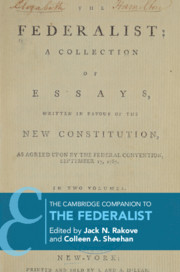Book contents
- The Cambridge Companion to The Federalist
- Other Volumes in the Series of Cambridge Companions to Philosophy
- The Cambridge Companion to The Federalist
- Copyright page
- Contents
- Contributors
- Acknowledgments
- Abbreviations
- Introduction
- 1 Publius and the Anti-Federalists:
- 2 John Jay, The Federalist, and the Constitution
- 3 “A Vigorous National Government”: Hamilton on Security, War, and Revenue
- 4 “The Known Opinion of the Impartial World”
- 5 The Federalist’s New Federalism
- 6 The Political Psychology of Publius
- 7 Montesquieu, Hume, Adam Smith, and the Philosophical Perspective of The Federalist
- 8 Madison’s Republican Remedy
- 9 The Republicanism of Publius
- 10 “The Interest of the Man”: James Madison’s Constitutional Politics
- 11 Politics Indoors and Out-of-Doors
- 12 “The Cool and Deliberate Sense of the Community”
- 13 Publius on Monarchy
- 14 The Genius of Hamilton and the Birth of the Modern Theory of the Judiciary
- 15 Publius’s Political Science
- 16 The Republican Form of Government in The Federalist
- Index
- Other Volumes in the Series of Cambridge Companions to Philosophy
14 - The Genius of Hamilton and the Birth of the Modern Theory of the Judiciary
Published online by Cambridge University Press: 28 February 2020
- The Cambridge Companion to The Federalist
- Other Volumes in the Series of Cambridge Companions to Philosophy
- The Cambridge Companion to The Federalist
- Copyright page
- Contents
- Contributors
- Acknowledgments
- Abbreviations
- Introduction
- 1 Publius and the Anti-Federalists:
- 2 John Jay, The Federalist, and the Constitution
- 3 “A Vigorous National Government”: Hamilton on Security, War, and Revenue
- 4 “The Known Opinion of the Impartial World”
- 5 The Federalist’s New Federalism
- 6 The Political Psychology of Publius
- 7 Montesquieu, Hume, Adam Smith, and the Philosophical Perspective of The Federalist
- 8 Madison’s Republican Remedy
- 9 The Republicanism of Publius
- 10 “The Interest of the Man”: James Madison’s Constitutional Politics
- 11 Politics Indoors and Out-of-Doors
- 12 “The Cool and Deliberate Sense of the Community”
- 13 Publius on Monarchy
- 14 The Genius of Hamilton and the Birth of the Modern Theory of the Judiciary
- 15 Publius’s Political Science
- 16 The Republican Form of Government in The Federalist
- Index
- Other Volumes in the Series of Cambridge Companions to Philosophy
Summary
In late May 1788, with The Federalist’s essays on Congress and the executive now completed, Alexander Hamilton turned finally to Article III and the judiciary. His six essays on the judiciary, Federalist 78–83, had only a limited effect on ratification. No newspaper outside New York reprinted them, and they appeared very late in the ratification process – after eight states had ratified. But, if these essays had little immediate impact – essentially limited to the ratification debates in New York and, perhaps, Virginia – they were a stunning intellectual achievement. Modern scholars have made Madison’s political and constitutional theory the great story of the Federalist, and Federalist 10, in particular, has long been “in the center of constitutional debate.” But careful study of essays 78–83 reveals that Hamilton had an innovative and consequential vision of the law and the judicial role that deserves at least as much attention as Madison’s contributions.
- Type
- Chapter
- Information
- The Cambridge Companion to The Federalist , pp. 464 - 514Publisher: Cambridge University PressPrint publication year: 2020



